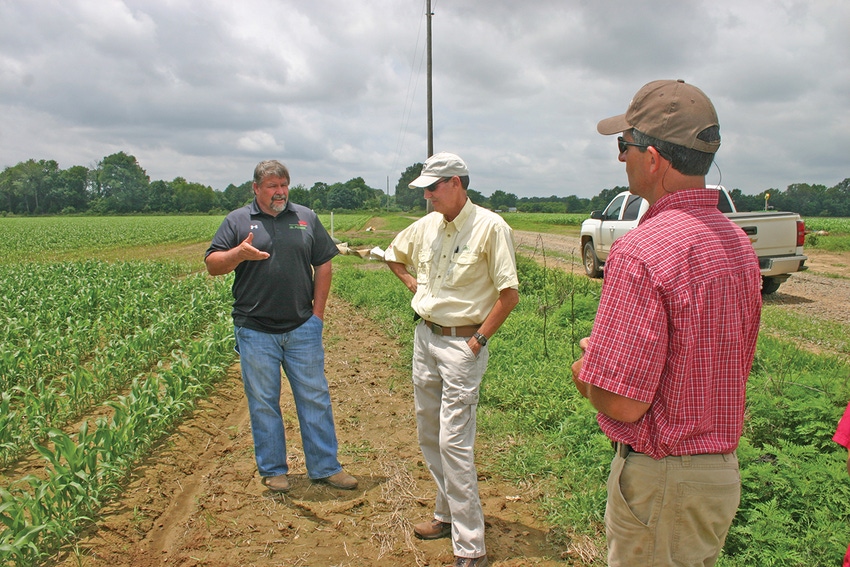
Just south of DeWitt, Ark., a foursome walks a lush, 122-acre field of month-old grain sorghum. The soil is still tacky from recent rains.
The field, it turns out, actually contains Pioneer “Product Advancement Trials” (PAT) experimental varieties. And that’s just fine with the brothers, Brad and Jody Hearn, who farm the acreage.
“From our perspective, they’re welcome to run the (PAT) trials in our fields,” says Brad. “We appreciate being able to see first-hand what these varieties can do.”
“We’re always looking for something new,” says Pioneer’s William Johnson. “In the last two years, Dupont Pioneer has invested in looking at genetic markers. They’re examining the genetic code in grain sorghum to identify certain traits early on in the hybrid selection phase. That way, early in the breeding process, you’ll know if the trait is in the plant. That leads to being able to look at a lot more germ plasm and crosses. Over time, that will allow for better hybrids.
“Hopefully, over the next three to five years we’ll really see an increase in key traits and get some additional yield bumps.”
Otis Howe, Johnson’s colleague, says “we’re looking at experimental products out here and comparing them to products we’re already selling. To make the cut, any of these experimentals will have to be better than the counterpart already on the market.
“I’ve got four of these trials in my part of Arkansas. The other product agronomists have their own. At the end of the year, we’ll look at all the data and decide if any of them are worth advancing.”
How many experimentals does Howe typically have in a trial field?
“There are three out here.”
Seed source
Where does most Pioneer sorghum seed come from?
“We draw from research stations from Taft, Texas, all the way into northern Kansas where they’re doing the selections,” says Johnson. “A lot of the hybrids that work in the high humidity, high rainfall and high production areas of the coastal region of Texas tend to work well south of I-40.
“North of I-40, the hybrids that come out of Kansas breeding program work well from the Missouri bootheel down to West Memphis.”
The farmers manage the trials just like they do the rest of their fields, says Howe. “There’s nothing special about how they treat my plot. We used their planters to plant the plot, actually. I poured the seed into the planter but from there on, management is theirs.”
How robust has the shift in Delta milo management been?
“Oh, there’s been a large movement towards paying close attention to the sorghum,” says Howe. “It used to be a crop you planted on old, tough, dryland ground that nothing else grew very well on.
“Now, you have farmers coming to the crop like Brad and Jody do. If it needs irrigation, fertilizer, fungicides, whatever – it’s being managed for high yields.”
Some of the highest yields of grain sorghum ever recorded in the state have been off the University of Arkansas testing program at the Rice Research and Extension center at Stuttgart, says Johnson. “They’ve seen yields of 10,000 to 12,000 pounds aren’t uncommon.
“But they’re irrigating the sorghum, putting out large amounts of nitrogen fertilizer and intensively managing the crop. They largely followed a lot of what Kansas State University had done previously before the University of Arkansas Cooperative Extension Service published a production handbook with current Arkansas recommendations.”
Johnson also praises grain sorghum checkoff funds that “have really helped fund research to generate the data that leads to recommendations. In the last 10 years, there’s been a lot of work and a lot of updated recommendations have come out of that.”
Advancements
There have been other advancements, as well.
“When Prevathon insecticide came out, it took out a lot of the worry about lep species. Webworm used to be a major problem in sorghum. Corn earworm and fall armyworm were also a threat. Prevathon takes out the worms and pyrethroids are good for controlling midge.
“Last year, the sugarcane aphid hit some Mid-South fields and scared a lot of people. What’s interesting is that this year the sugarcane aphid populations in Texas build up and then crash. There hasn’t been a steady proliferation. No one can figure out exactly why that’s occurring. Maybe it’s the wetter weather or more species to feed on. But down there significantly less of the crop has been treated this year compared to last year.”
How much did your milo seed sales go up this year?
“Two-and-a-half times,” says Howe. “We had to go to Texas this year to bring in additional seed because we sold through what was in our demand plan very quickly.
“The spike started last winter. Our current line-up sold out overnight, it seemed like.”
Brad says his “understanding is China is the reason the price went up. We forward booked ours at 85 cents over the board price. That was very appealing.”
And such prices may stick around.
“There’s speculation that premiums will be even higher next year,” says Johnson. “This isn’t a one-year deal but they’re expecting sorghum demand to be up for the next three to five years.”
Back on inputs, Johnson says, “We thought corn responded well to fungicides. But what we’ve seen with fungicides on sorghum is amazing.”
What are the Hearn’s plans for their milo?
“We’ll probably side-dress with one more shot of fertilizer at early boot. We just put heavy side-dress on it before the last rain.
“Other than that, we’ll just make sure to irrigate it properly watch to see if it needs a fungicide. It’s really a simple crop to grow compared to others. We might have to go over rice fields seven or eight times with an airplane at $7 or $8 a trip. With sorghum, other than a potential fungicide we won’t need an airplane.”
About the Author(s)
You May Also Like




